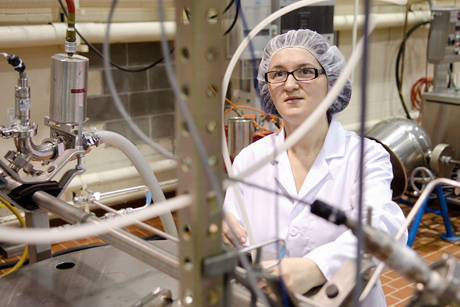Scientists jump start New York businesses
By Krisy Gashler

A confectionary company is seeing a boom in cookie sales. Can it get the frosting to dry faster? An entrepreneur has developed a saliva test for endometriosis; can a similar technology help farmers know when to breed their cows?
Two questions, one solution: Call the Cornell Center for Materials Research (CCMR).
Supported by New York state, the National Science Foundation and Cornell, the CCMR Industrial Partnerships Program has been helping companies develop and optimize new products since 2001.
John Sinnott, the industrial programs manager at CCMR, oversees the JumpStart program, which matches New York businesses in need of technical help with experts at Cornell. He said JumpStart supplies up to $5,000, which participating companies match, to cover supplies, lab work and student help. In the program’s nine years, it has funded 59 projects, with five more recently added (see sidebar).
One such company is Syracuse-based The Decorated Cookie Co./Corso’s Cookies, which supplies decorated cookies to Barnes & Noble, Amazon and Cracker Barrel, among others. Before shipping, however, the frosting has to dry completely, and that was taking two full days, said the company’s quality director, Michael Ricci.

“We manufacture 10,000 decorated cookies per shift,” Ricci said. “This caused quite the bottleneck in our operations.”
Sinnott matched Corso’s with Carmen Moraru, associate professor of food science. With help from two students, Moraru adjusted the frosting’s ingredients and introduced a method to reduce drying time to about four hours.
“This was definitely a great learning experience for the students because they could see how research done in a laboratory could have a real impact on a problem in the industry,” Moraru said. “And the fact that it was a small New York company was a motivator for us.”
“This result is having an immediate impact to our business,” said Ricci, noting that the firm just got Costco’s business. “This necessitates the need for us to increase our production by 50 percent and to add a second shift. The logistics of this operational change would have been much more challenging without Cornell’s help.”
Other new JumpStart projects with Cornell include:
• Lionano Inc., Ithaca, will collaborate with Professor Héctor Abruña, chemistry and chemical biology, to study the efficiency and reliability of an advanced drop-in replacement anode material for lithium-ion batteries used in electric vehicles.
• Omniafiltra LLC, Beaver Falls, will collaborate with Professor Alan Taylor, horticulture, to test recycled fiber and seed combinations to determine such factors as the optimal nutrients, seed concentrations and paper densities that will produce a seed containing paper with excellent biodegradability and seed germination.
• Wool and Prince LLC, New York City, will collaborate with Professor Margaret Frey, fiber science and apparel design, to characterize the antibacterial performance of the wool fabrics used in making superfine wool shirts.
JumpStart awards grants twice yearly to companies interested in Cornell’s expert help. The next application deadline is June 30.
Oratel Diagnostics, based in Hammondsport, N.Y., was also jump-started with Cornell’s help. Oratel’s first JumpStart grant, in 2009, involved a saliva test it had developed to detect imbalances in hormone-sensitive proteins linked to the gynecological condition endometriosis, which can cause pain and infertility.
With help from a research group in the Department of Biological and Environmental Engineering, Oratel optimized its test matrix. The simple device uses a color-changing strip indicating the presence or absence of endometriosis.
It is now in clinical trials at Brigham and Women’s Hospital in Boston.
That collaboration was so successful that Oratel applied for another, with Professor Ulrich Wiesner in the Department of Materials Science and Engineering, which will begin this semester.
On large farms, it can be difficult to tell which cows are ready to be inseminated, and many farmers try to put groups of cows on the same breeding cycle using hormones. Oratel has developed a vaginal mucosal test that can determine within 24 hours whether a cow is ready to be bred.
“They’ve been studying this for about a year, and just in this early test, they’ve been able to do a 30 percent increase in the pregnancy rates for cows,” Sinnott said.
Krisy Gashler is a freelance writer for the College of Agriculture and Life Sciences.
Media Contact
Get Cornell news delivered right to your inbox.
Subscribe